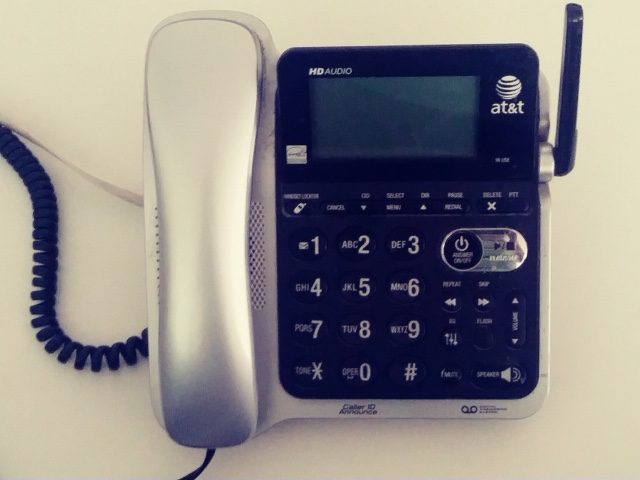Consumers need a clear choice with “deals” to drop landlines
Traditional landline
October 14, 2019
OPINION
In recent surveys, approximately 50% of American households report no longer having a traditional landline phone. For the other half of the populace, the two largest providers of landline service in Arizona (and throughout the western US) are going in different directions.
Cox Communications has been mailing out fliers to its customers for the last couple of years stating the urgency of setting an appointment to “upgrade” their landline service.
In reality, it is a cost-cutting move by Cox to switch all their customers over to cheaper Internet VOIP phone service (think “Vonage”).
However, there usually isn’t a corresponding reduction on customers’ bills.
VOIP telephone is actually a downgrade from traditional copper wire and fiber optic service which has been in place for over 100 years.
When your internet or electricity goes out, your VOIP telephone service will also go out, while your traditional landlines are unaffected. In addition, VOIP voice quality is spotty, just like the internet connections they depend on.
How often is internet slow or out altogether?
Copper wire calls are crisp and clear, even on a coast to coast call the person on the other end of the line sounds like they are right beside you. This is the mantra of Cox’s main competitor, CenturyLink, which has no plans to switch to VOIP or alter the copper wire system that has served the country well since the late 1800s. Of course, there have been many improvements since then but the same principle applies. Copper carries the best sound.
In a Consumer Reports study, the voice quality on copper landlines was better than that of the best cell phones, especially important If you suffer from hearing loss, or you spend a lot of time talking on the phone. VOIP calls are often of poor quality and can be very unreliable.
If you watch news programming where the screen is divided and the host is interviewing one or more remotely located guests, you’ll notice the hosts seem to always be interrupting the host or each other.
Either talk show hosts and their invited guest pundits are rude (many are), or there is a delay in the voice (phone) transmissions and the ensuing seconds leading to people talking over each other on either a VOIP or cellphone call which their network is using.
Most cellphone users are just used to this delay and talking over one another.
Most young people have never made a call on a copper wire phone and aren’t aware of the quality and timing difference-perhaps a seemingly small, but disappearing exercise in civil discourse— in at least a small but substantial way.
Of course, this isn’t to suggest we trade back our cellphones for copper landlines, but if we have the choice, let’s keep the landlines.
The optimal word—choice.
We love our cell phones—they have all the portable and quick search access we have grown to rely on.
However, there’s still a large number of medical alert and alarm systems that only work with landlines.
Most companies offering Internet or cable TV services will throw in the landline service including unlimited nationwide calling, as part of a bundle package, making the service virtually free.
In addition to better sound quality and reliability, in the event of an emergency call to 911, a traditional landline will provide your exact address (including apartment number) to the operator.
On a VOIP or cellphone call, it may or may not, depending on several factors.
In an emergency that uncertainty can be life-changing.
Nationwide, companies pushing VOIP service claim they are updating old technology.
In reality, they are cutting costs, pocketing the difference, and leaving consumers with an inferior product.
Bad reception and a bad deal.



Mobile Broadband NZ • Sep 7, 2020 at 12:40 am
Here we get to know about consumers need choice to drop landlines information in detail. It helps us to decide that which one is best among its types. I enjoyed reading this article and would suggest others it as well. Thank you for this article! This is really very informative for us.
Alisha Ross • May 26, 2020 at 2:44 am
This design is spectacular! You most certainly know how to
keep a reader amused. Between your wit and your videos, I was almost moved to start my own blog (well, almost…HaHa!) Fantastic job.
I really enjoyed what you had to say, and more than that, how you presented it.
Too cool!
Regards
Ross Alisha
Nat • May 25, 2020 at 7:45 am
From my experience with my company, virtual phone numbers are an exceptional choice for quality and service, in regards to making VoIP-based calls. I have purchased a range of numbers, such as toll free US numbers, local numbers, and international numbers from Global Call Forwarding and my experience has been wholly positive. I highly recommend this for any business that is aiming to execute an international expansion, or maintain a high level of communication globally.
kristi • Oct 15, 2019 at 12:11 am
Virtual number are best as compared to landlines numbers. reasonable and reliable and it having communication capabilities like call recording, call forwarding, voicemail, IVR, and so on.
https://callhippo.com/virtual-phone-number